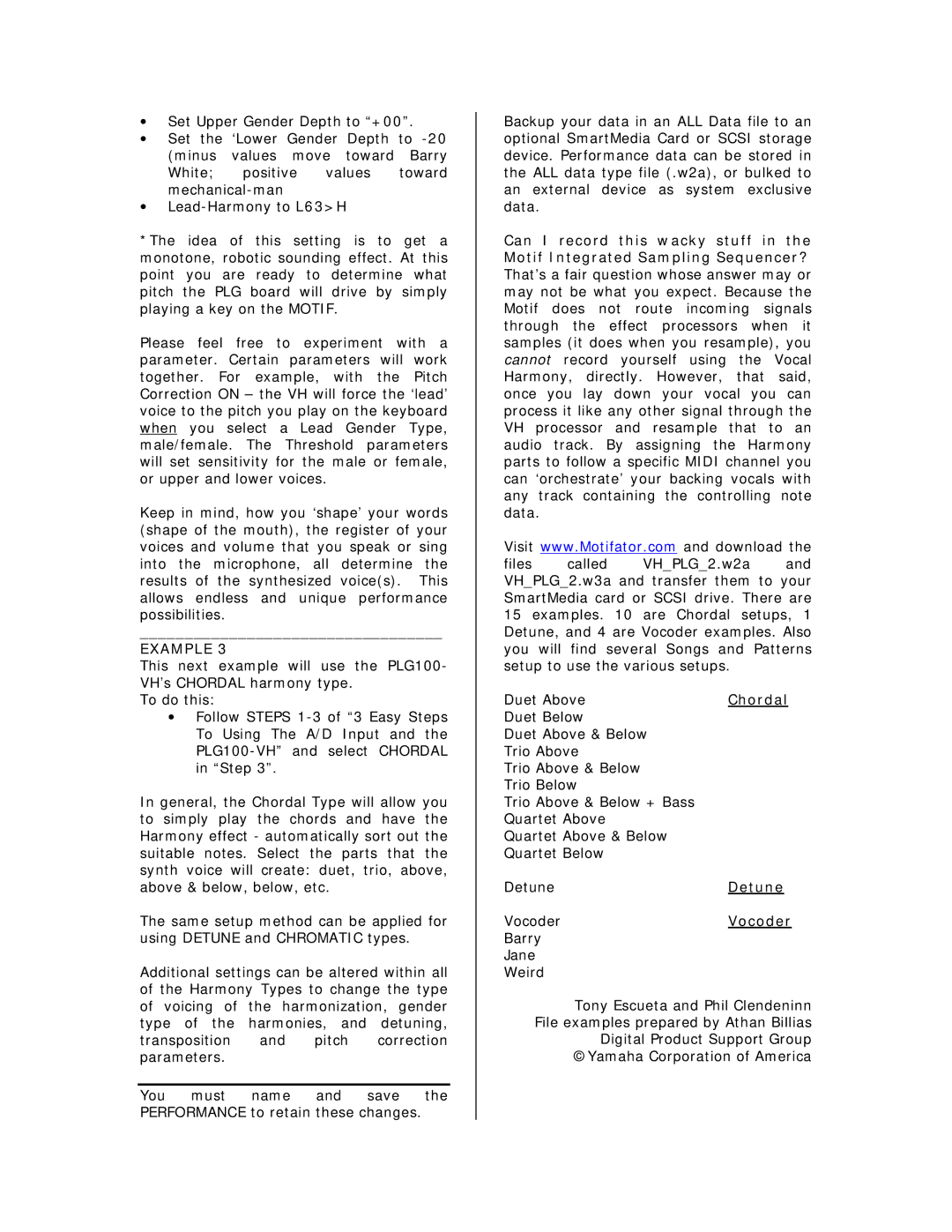
•Set Upper Gender Depth to “+00”.
•Set the ‘Lower Gender Depth to
•
*The idea of this setting is to get a monotone, robotic sounding effect. At this point you are ready to determine what pitch the PLG board will drive by simply playing a key on the MOTIF.
Please feel free to experiment with a parameter. Certain parameters will work together. For example, with the Pitch Correction ON – the VH will force the ‘lead’ voice to the pitch you play on the keyboard when you select a Lead Gender Type, male/female. The Threshold parameters will set sensitivity for the male or female, or upper and lower voices.
Keep in mind, how you ‘shape’ your words (shape of the mouth), the register of your voices and volume that you speak or sing into the microphone, all determine the results of the synthesized voice(s). This allows endless and unique performance possibilities.
__________________________________
EXAMPLE 3
This next example will use the PLG100- VH’s CHORDAL harmony type.
To do this:
•Follow STEPS
In general, the Chordal Type will allow you to simply play the chords and have the Harmony effect - automatically sort out the suitable notes. Select the parts that the synth voice will create: duet, trio, above, above & below, below, etc.
The same setup method can be applied for using DETUNE and CHROMATIC types.
Additional settings can be altered within all of the Harmony Types to change the type of voicing of the harmonization, gender type of the harmonies, and detuning, transposition and pitch correction parameters.
You must name and save the PERFORMANCE to retain these changes.
Backup your data in an ALL Data file to an optional SmartMedia Card or SCSI storage device. Performance data can be stored in the ALL data type file (.w2a), or bulked to an external device as system exclusive data.
Can I record this wacky stuff in the Motif Integrated Sampling Sequencer? That’s a fair question whose answer may or may not be what you expect. Because the Motif does not route incoming signals through the effect processors when it samples (it does when you resample), you cannot record yourself using the Vocal Harmony, directly. However, that said, once you lay down your vocal you can process it like any other signal through the VH processor and resample that to an audio track. By assigning the Harmony parts to follow a specific MIDI channel you can ‘orchestrate’ your backing vocals with any track containing the controlling note data.
Visit www.Motifator.com and download the
files called VH_PLG_2.w2a and VH_PLG_2.w3a and transfer them to your SmartMedia card or SCSI drive. There are 15 examples. 10 are Chordal setups, 1 Detune, and 4 are Vocoder examples. Also you will find several Songs and Patterns setup to use the various setups.
Duet Above | Chordal |
Duet Below |
|
Duet Above & Below |
|
Trio Above |
|
Trio Above & Below |
|
Trio Below |
|
Trio Above & Below + Bass |
|
Quartet Above |
|
Quartet Above & Below |
|
Quartet Below |
|
Detune | Detune |
Vocoder | Vocoder |
Barry |
|
Jane |
|
Weird |
|
Tony Escueta and Phil Clendeninn File examples prepared by Athan Billias Digital Product Support Group ©Yamaha Corporation of America
